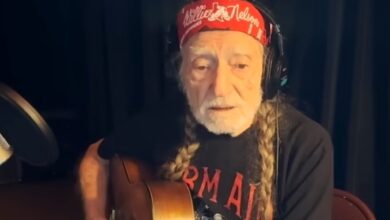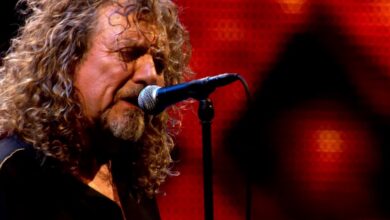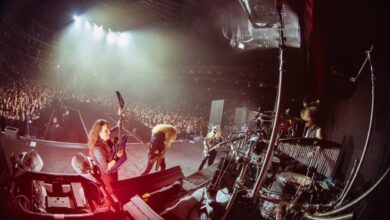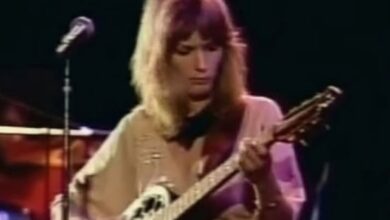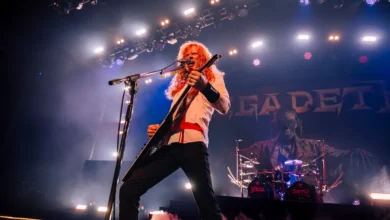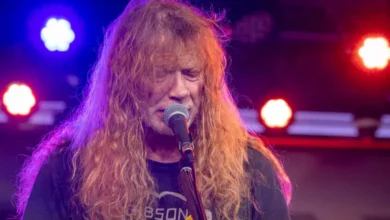Erik Grönwall’s “O Holy Night”: A Breathtaking Christmas Masterpiece Where Faith, Resilience, and Rock Energy Unite in Pure Brilliance
The announcement felt like a gift from the heavens: Erik Grönwall, the powerhouse vocalist who first captured Sweden’s heart after winning Idol in 2009 and later fronted both H.E.A.T and Skid Row, revealed a stirring and deeply spiritual version of “O Holy Night.” Filmed in a softly lit church, the performance wasn’t your typical festive cover—it was a cinematic prayer of gratitude and renewal. For a singer famous for high-voltage stages and roaring amplifiers, this was energy transformed into grace, every word pulsing with quiet conviction and faith.
While most audiences first encountered it in December 2024, his longtime followers sensed something special was coming. A cryptic teaser had promised a December 13 release at 5 p.m. CET, filmed with the blessing of Alunda Församling, the parish that opened its doors for the occasion. The choice of venue set the tone instantly—no auto-tune, no studio reverb, just the organic sound of stone, wood, and candlelight. When the video finally premiered, the opening image of flickering flames framed by still shadows introduced a performance that would melt the coldest night.
He begins with near-whispered restraint, each breath suspended between reverence and vulnerability. The phrasing feels like prayer, unhurried and full of purpose. Gradually the dynamics widen; soft piano undercurrents give way to orchestral depth, while Grönwall’s voice climbs from fragile to commanding. By the final chorus, the power erupts—majestic yet controlled, every high note delivered with absolute precision. Years of rock discipline surface here not as aggression but as mastery harnessed to devotion, proving that true strength often lives in stillness.
The deeper meaning behind the performance makes it even more powerful. After being diagnosed with leukemia in 2021, Grönwall underwent a bone-marrow transplant and fought his way back to health. His comeback became a symbol of resilience throughout the rock community. Having stepped down from Skid Row in 2024 to focus on recovery, he redirected that unstoppable drive into personal expression. “O Holy Night” wasn’t just music—it was testimony, sung by someone who knows what redemption sounds like when it returns through the lungs of survival.
The visuals mirror that rebirth. No strobes, no color grading, only golden candlelight illuminating rough-hewn pews and stone walls. Each lingering camera movement feels intentional, allowing emotion to unfold naturally rather than being edited for drama. When the final crescendo arrives, the lens moves close enough to catch the shimmer in his eyes—a moment that says everything without words. The result is simplicity elevated to art, a reminder that sincerity will always outshine spectacle when truth guides the frame.
Within days of release, the clip began spreading like a winter wildfire. Streams surged into the hundreds of thousands as fans from every corner of the world shared it across timelines and playlists. It wasn’t viral because of promotion; it was viral because of awe. People who normally posted guitar solos or tour footage were suddenly forwarding a Christmas hymn. Grönwall later confirmed that it was gaining more than 100,000 daily views and would soon be released on all streaming platforms for those wanting to carry its glow beyond YouTube.
The magic lies in the equilibrium between strength and serenity. His rock-forged voice lends muscle to the hymn, yet he never drowns its holiness. Every pause feels intentional, silence used as punctuation rather than absence. When the climactic phrase arrives, the power feels earned, not performed. That deliberate pacing transforms the familiar carol into something cinematic—a passage from hushed devotion to blazing transcendence, echoing both cathedral choirs and stadium anthems within a single breath.
Viewers responded with overwhelming emotion. Vocal analysts praised his seamless control and effortless top register, noting how he balanced resonance with restraint. Rock audiences admired the grit behind the polish, while spiritual listeners celebrated its reverence. Comment sections overflowed with goosebump confessions and tears. Across cultures and generations, the consensus formed quickly: this was no mere Christmas cover—it was a moment that dissolved genre walls and spoke directly to the soul.
Recording inside a real sanctuary gave the song its sacred heartbeat. Each note bounced naturally across vaulted ceilings, creating reverb that technology could never fake. You can almost hear the walls breathe with him. As the final chord fades, the stillness becomes part of the composition—a shared silence between performer and space. It’s authenticity distilled, sound transformed into spirit, and faith rendered audible through acoustics alone.
The performance also completes a personal circle. Before fame, Grönwall sang in community choirs, learning discipline and harmony before discovering rock’s explosive freedom. Decades later, illness guided him back to those roots, reminding him of music’s healing origin. “O Holy Night” unites both halves of his journey: the choirboy and the frontman, humility and thunder intertwined. It doesn’t reject his past—it redeems it, reshaping rock energy into something luminous and serene.
From a technical standpoint, it’s a masterclass in breath support and tone shaping. He opens vowels for resonance, supports phrases from the diaphragm, and sustains the climactic “divine” without strain, each over-tone ringing pure. Listeners may not know the mechanics, but they feel the result—a mix of tension and release that mimics the sensation of light breaking through clouds. It’s skill turned spiritual, discipline disguised as emotion.
Small visual details carry emotional weight: a subtle smile before the last verse, a glance heavenward, the gentle sigh that escapes once the music stops. None of it feels staged. It’s presence captured in real time, an artist completely absorbed by what he’s giving. In a digital world saturated with filters, this kind of authenticity feels revolutionary, proving that vulnerability can strike harder than spectacle ever will.
Timing also played a role in its resonance. Released mid-December and later uploaded to streaming platforms, it quickly became part of listeners’ annual rituals. Each winter, it reappears on curated playlists and social feeds like a recurring beacon of comfort. Grönwall himself noted that fans begged for an audio version—a sign that it had already entered the modern canon of holiday classics, reborn through rock yet rooted in reverence.
For Scandinavian fans, “O Helga Natt” carries deep cultural weight. Performed in English but filmed in Sweden’s spiritual heartland, the rendition felt both global and local. The church setting and Northern stillness gave it the solemnity of a traditional Lucia concert, while his delivery bridged that heritage with international rock passion. In that fusion, he built a bridge between cultures—Nordic calm meeting raw, universal gratitude.
Ultimately, “O Holy Night” embodies more than vocal brilliance; it’s a portrait of survival transmuted into art. It proves that even the loudest voices can whisper truth when stripped of noise. Each December, new listeners discover it and fall silent, while longtime fans return to relive the serenity. In that shared hush lies its legacy—a single voice, a thousand candles, and a song that glows like faith reborn through sound.
Before long, Grönwall expanded this creative rebirth into other classics. His haunting take on Mariah Carey’s “Without You” showcased the same blend of tenderness and sheer vocal command, reshaping a pop ballad into a storm of emotion. Soon after came his riveting rendition of Whitney Houston’s “I Will Always Love You,” delivered with both precision and soul. Each interpretation reinforced his gift: a rock voice capable of moving hearts as deeply as it can shake arenas.
His fearless journey through genres continues to inspire. By merging reverence with rebellion, Grönwall has proven that music’s truest power lies in emotion, not category. “O Holy Night” remains his defining statement—proof that after conquering illness, stages, and expectations, he can still surprise the world with something even stronger than volume: grace. When he sings that final note, it’s more than performance—it’s gratitude made audible, echoing long after the lights go out.
